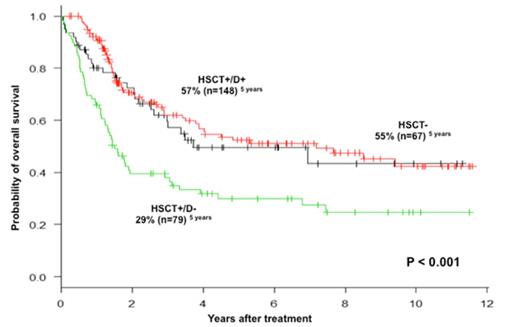Abstract
Introduction
Predicting treatment outcome of acute leukemia has been an important issue. Many factors have been elucidated. We evaluated the impact of donor's availability on treatment outcome including mortality in patients with acute lymphoblastic leukemia (ALL).
Methods
A total of 294 patients with ALL were evaluated after receiving chemotherapy between year 2001 and July 2014 at our center. Patients were assessed for the need of hematopoietic stem cell transplants (HSCT), availability of HLA sibling match donor and the impact on overall outcome. Indications for transplantation were defined as (1) WBC->100,000 for T-ALL, >30 for B-ALL with, (2) cytogenetic abnormalities of t(9:22), (4:11) or (1:19), (3) relapse or primary refractory disease or (4) MRD positivity. Patients were divided into 3 categories, group A with an indication for HSCT and available donor (HSCT+/D+), group B with HSCT indication but no available donor (HSCT+/D-) and group C with no indication for HSCT regardless of donor status (HSCT-).
Results
The median age was 20 (14-63 years). 95 (32%) were female while 198 (68%) were male. 276 (86%) patients were newly diagnosed while 18 (14%) were relapsed. Immuno-phenotype was B for 191 (65%), T for 91 (31%) versus mixed lineage for 12 (4%). 33 (11%) patients were positive for Philadelphia chromosome. Median WBC at diagnosis was 23.2X109/L CNS involvement was positive in 26 (8%) patients.
With a median follow-up of 60 months for survivors (range 2 to 116.5 months), 148 (50%) patients showed HSCT+/D+, HSCT+/D- in 79 (27%) and HSCT- in 67 (23%) patients.
the 5-year OS for HSCT+/D-, HSCT+/D+ and HSCT- were 29%, 57% and 55% (p value <0.001), (figure A) while DFS was 25%, 44% and 44% (p value =0.004), respectively. No statistical significance difference was noted on NRM between the groups. On multivariate analysis for OS, donor unavailability was confirmed as an independent risk factor (p<0.001, HR 2.21).
Conclusion
Our study suggested that unavailability of donor is an independent risk factor on OS. The use of alternative donor and building national /regional unrelated donor registry is highly warranted even in countries with high probability of finding matched sibling donor.
Kim:Bristol-Myers Squibb: Consultancy, Research Funding; Novartis Pharmaceuticals: Consultancy, Research Funding.
Author notes
Asterisk with author names denotes non-ASH members.


This feature is available to Subscribers Only
Sign In or Create an Account Close Modal